#da solas meta
Text
Let’s Talk Solas on the Balcony
A comic in which Solas and a Qunari Inquisitor discuss his views on the Qunari people is making the rounds. Per usual, it is sparking conversations and arguments about whether Solas is a racist piece of shit or not. I don’t think people’s opinions can be swayed one way or another at this point, so I’m not going to try.
What I want to talk about is the diffculty Weekes would have had writing this scene, the contradictory nature of the balcony conversation with banter, and the fact that Solas may not be entirely wrong (although he shouldn’t have said it that way).
The writing. I’m going to use the Qunari balcony conversation because it’s the most egregious, but all conversations Solas has with an Inquisitor of any race are problematic. I don’t think the intention was to cast Solas as a racist. I could be proven wrong in Dreadwolf, of course, but for now, let’s say that was not the intention.
Weekes had the Herculean task of writing the “loyalty” conversation that happens after every companion quest is successfully completed. That isn’t an easy thing to do when the character is hiding the kind of secrets Solas is and who might not be feeling particularly loyal at the time.
The writer must show that Solas has doubts about his plan based on his observations of a single person – the Inquisitor. Weekes must show that Solas is looking for anything he can cling to, to justify his plans. They must show Solas’ growing admiration for the Inquisitor – in some cases against his better judgement. They must show that Solas is only just beginning to realize these people are real and destroying them would make him a monster. They must do it all without giving away the stinger. Not easy and very open to misinterpretation.
I love Weekes as a writer but even they can miss the mark. Solas has a tendency to say whatever is on his mind in the most socially awkward way possible. Probably because he spent 4,000 years conversing only with spirits. I love Cole but imagine spending that long in a place where everyone talks like that. Also Solas' first language is Elvhen, a conceptual language that is much more fluid than the common tongue. He's trying to express complicated thoughts in a language that isn't his. Again the writer has not and probably can't give us this context.
What Solas says on the balcony contradicts his banter. This could be because of the way banter triggers. It’s possible that banter was meant to trigger after the balcony conversation to show the growth of the character. But let’s look at it.
In an exchange with Bull Solas defends Tal Voshoth. Bull calls them savages and says they are sick. Solas says they aren’t. They are victims of a sociopolitical system that denies them agency so when they gain it, they don’t know what to do with it.
If you save the Chargers, Solas is the person that helps Bull through his concerns that without the Qun he will turn into a mindless beast. My family has dealt with enough racism to know that a racist would never do that. Basically, if Solas was a racist, he would absolutely believe Bull is right and he will eventually turn into an animal.
Solas’ problem- as has been stated multiple times - is with the Qun and the fact that most Qunari don’t question the regime they live under. The Qun removes agency from the people. That is anathema to Solas. The problem with the balcony conversation is that this isn’t expressed. Solas seems to be saying he believes that without the Qun all Qunari are savage brutes when he clearly defended all Qunari who have rejected the Qun.
It’s poor writing because it isn’t made clear that this is Solas’ problem with the Qunari. When he says the Inquisitor is different he means that they question the world around them. They don’t take things for granted or mindlessly follow whatever their society dictates. Again, poor writing choices don’t make this clear.
And Solas isn’t entirely wrong. The Qunari aren’t savages but they can be brutal. Most of us have played all three games. We have learned a lot about the Qunari and it isn’t all good.
Their goal is for everyone to live under the Qun. The entire second act of DA2 explores what your average Qunari believes. We must fight through Kirkwall because the Qunari have decided the city would be better off under the Qun. We know that the Qunari treat their mages even worse than humans treat mages. Circles are bad but the Qunari cut out the tongues of their mages, sew their mouths shut and give them personal minders. They are fed a chemical that keeps them pliable (a chemical they feed anyone who is judged to be a problem child as Fenris tells Isabella).
The Qunari don’t have names. They have numbers. Their “names” are just their job descriptions. They can have all the sex they want but when it comes to children there is a breeding program. They are told what jobs they will do. If they don’t do what they are told, they can be made Tal Vashoth or killed. In DA2 we free a Qunari mage who doesn’t want to be free and self-immolates because he feels that’s what he must do under the dictates of the Qun. Most Qunari, even Bull, would rather turn themselves over to re-educators than become Tal Vashoth because they have been told they will turn into savages without the Qun to guide them.
As of Tevinter Nights we know that a subset of the Qunari decided to take the “Path of Blades” to forcibly get other races to submit to the Qun.
Solas would see all of this and hate it. He doesn’t hate the Qunari people - which is an aspect of racism - only what they have become because of the system they live under. The Inquisitor is different, not because they are a special snowflake (they are because they are the hero of the story) but because they don’t believe in the Qun.
The fact that Qunari can throw off what he perceives to be their shackles confuses him and makes him believe that they and possibly Bull aren’t the only ones capable of doing this. That’s not good for his plan. That’s why he wants to know if the Anchor has affected them. He wants to believe they are special because of the Anchor so he can carry out his plan with a clear conscious.
I think this is true of the other conversations with other Inquisitors. The solution to the problem would have been for the Inquisitor to be able to strongly push back against Solas’ comments. Weekes could have then provided some clarity. As it is we get no clarity and people are left with misconceptions.
#solas#dragon age inquisition#dragon age#solavellan#dai#fen'harel#solas dragon age#solas dread wolf#dai solas#da meta#da solas meta#dai meta
34 notes
·
View notes
Text
this post is under a cut in case anyone would consider it to be DA:D spoilers, as the things it mentions came from the leak a year ago (spoiler warning for link) that included screenshots and a gif of the game. (the things this post mentions are therefore not new information and this does not reference a new leak)
I'm just thinking again about Rook (which seems to be the PC's name or title) and the imagery conjured by the name. ◕‿◕ this post is just speculation and overanalyzing for fun. also this post is a now-finished draft from my draft section from a while back.
I think it would work as a surname (like "Hawke") or a codename (think Leliana's spies and contacts such as "Butler", "Farrier", "Butcher", "Charter", etc although these are all professions that end in "-er" or "or" iirc). it could also be a title (like Warden, Hero, Champion, Inquisitor, Herald) or a nickname - like maybe it's short for "Rookie", it's a Varric-assigned nickname and it references how the DA:D PC is the newest member of the team after he recruits them?
I think it sounds catchy, and cool - it's snappy and short, Hawke-like in this way. and it sounds like the kind of name a spy or secret agent might have in a fantasy, superhero or sci-fi-type setting.
a rook is a black bird, Corvus frugilegus, a member of the corvid family. rooks have been perceived as vermin and nuisances by people in the past, and persecuted due to this. they bear a resemblance to their crow and raven relatives, both birds which have a large cultural footprint and lots of symbolism in areas such as folklore and art. Hawke obviously also had a bird motif going on from their surname and associated art pieces. corvids also bring to mind the Antivan Crows (assassins, thieves, & spies), reminding of the stuff about how in this game the PC may be trying to operate under the radar, and the reporting on a previous iteration of DA:D which had the game concept as being focused on spies and heists. rook plumage is inky black, bringing to mind darkness and shadow.
from the bird angle, a "rook" sounds neat opposite a "wolf" imo. wolves are obviously another animal that have large footprints in culture, myth and folklore. in the natural world there is symbiosis sometimes between wolves and corvids when hunting/feeding. there are lots of photos of wolves and corvids together.
a colony of rooks is called a rookery. of course, the fortress of Skyhold has a rookery. it's from there that Inquisition Spymaster Leliana operates (operated) sending her black birds on missions with letters and messages to her many agents and spies throughout Thedas. what if Rook is one of Leliana's... "rooks"? a spy or agent of the remnants of the Inquisition.
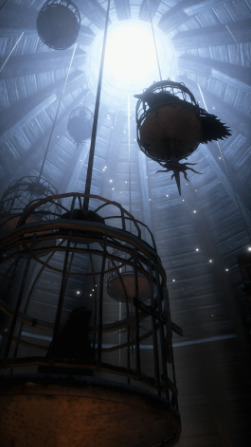
A rook is also defined as "A cheat or swindler; someone who betrays" [noun], "mist, fog" [noun] and "to cheat or swindle" [verb]. it's also a type of trick-taking card game. these sorts of things bring to mind a rogueish, stealthy aspect, and the shady, shadowy dealings and card-game played in Minrathous Shadows.
a rook is also a chess piece. they're castle-like (since "rook" can also mean a castle or fortification) and usually have their top in the shape of a battlement. they can move in any direction along a rank or file on a chessboard on which they stand (horizontal/vertical, not diagonal). they can also do the "castling" move. in history, rooks have also been called towers, castles, rectors and marquesses. in chess, each player starts the game with two rooks at opposite ends of the first rank. chess itself is a game of strategy and tactics. "the chessmaster" as a trope is a character type who manipulates events, tugging on strings and moving 'pieces' into place on a metaphorical chessboard. [Solas' DA:I dialogue about his past, like the one he has with Sera about cells of spies/agents, hark to this]
in the castling move,
"Castling is a move in chess. It consists of moving the king two squares toward a rook on the same rank and then moving the rook to the square that the king passed over. Castling is permitted only if neither the king nor the rook has previously moved; the squares between the king and the rook are vacant; and the king does not leave, cross over, or finish on a square attacked by an enemy piece. Castling is the only move in chess in which two pieces are moved at once."
castling rules often cause confusion, even occasionally among high-level players. historically the move has its roots in the "king's leap", of which there were two forms and which arose in part it seems due to increasing importance of king safety as other pieces were given increased powers through time as the game developed. "the king would move once like a knight, or the king would move two squares on its first move. The knight move might be used early in the game to get the king to safety or later in the game to escape a threat." basically it moves the king away to safety and the rook to a more active position. there is also kingside castling and queenside castling. I wonder, symbolically.. is Rook more the king's rook, or the queen's rook? (reminds me of the Left Hand and Right Hands of the Divine hh). who or what is the king in this hypothetical analogy? the World of Thedas itself? as a castle or fortress.. Rook is the bulwark against what's to come? [over-thinking ik ik, tis just for fun hh].
by now we're all familiar with the chess game Solas plays in banter dialogue with Iron Bull during DA:I. in the in-world chess game, rooks are called towers. Solas moves his right-hand tower once. at a later point in the game, Iron Bull's "Arishok" piece takes Solas' left-hand tower, getting a check and leaving him feeling triumphant. Bull asks Solas wth he is doing as Bull takes Solas' remaining tower. "Your last tower, by the way". Bull, a spy and liar himself, bears down on Solas' pieces "with his full army", thinking a win is in sight. Undeterred, Solas executes a few moves in a sneaky plan and entraps Bull in a checkmate, winning the game after sacrificing various pieces to enact his plan.
rook also brings to mind the Tower tarot card and its meanings. it's associated with sudden, disruptive revelation and potentially destructive change. it connotes danger, crisis, sudden change, destruction, higher learning, and liberation, as well as adversity, calamity, deception, ruin and unforeseen catastrophe. reversed, it connotes things such as negligence, carelessness, apathy and vanity (vanity.. pride). in this depiction of the Tower tarot, lightning strikes from the sky, striking a crown (hubris) off the top of a tower and setting it alight as people fall from the tower to their doom. this imagery and the upright meanings of the card bring to mind the sudden massive change Solas seeks to bring about (destroying the Veil), the revelations and liberation for some that it might bring, his identity as Fen'Harel Lord of Tricksters (deception) as well as the destruction he seems to think the Veil destroying action will cause ("as the world burns in the raw chaos"...). the 'Tower scene' has also already played out once before in Thedosian history, when Solas created the Veil and sealed the Evanuris away, leading to the fall of Arlathan and its wonders. in modern Thedas, Morrigan and Flemeth (as well as possibly some side 'prophecy' type things) both allude to a big change coming to the world.
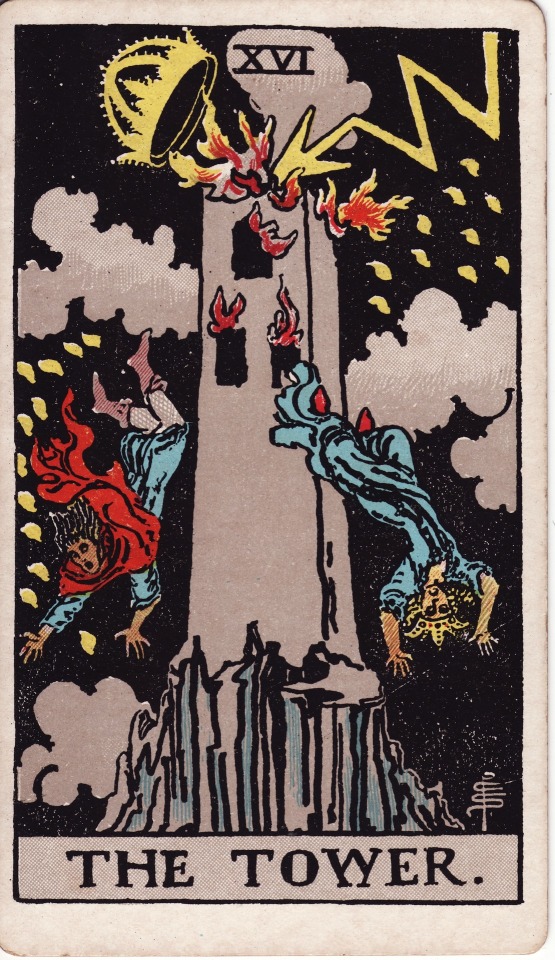
in DA:I, the Tower tarot card is ofc none other than Solas' ending card, if he is not romanced. in the DA:I version of the card, we see Solas, cloaked in a dark robe and holding a mage staff under a half-moon or eclipse. darkness seeps from his shadow, stark against the orange sky, and blends with the giant black Dread Wolf, looming ominously and open-mouthed above him with its many eyes. (the Tower tarot card Solas scene is later referenced in DA:D promotional art and DA:D-era in-world murals). it makes sense to have assigned this to Solas given the above discussed meanings of the Tower tarot card, but it's a verrry inchresting choice imo to then give "Rook" as a name/title for the DA:D PC.
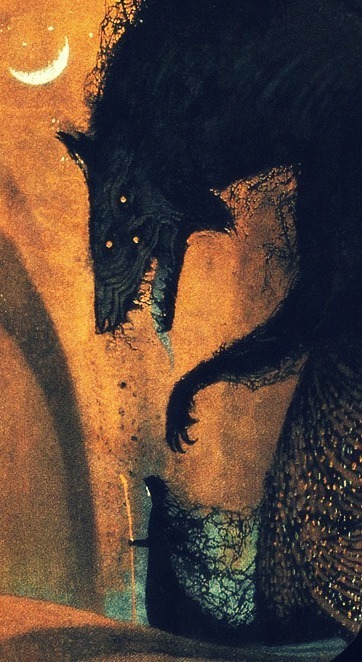
and most inchrestingly, there's the symbol from the front of Mark Darrah's mysterious Red Book. this mysterious red book shows "a flaming rook" on the cover. the book was an internal guide for developer and publisher eyes only that summarized the vision for DA:D, in its Joplin iteration. we know that the Joplin project has since been revised to an extent that it was the newly codenamed Morrison instead, but the red book is known to still contain plenty of ideas likely to appear in DA:D. most pages of the book remain highly classified. it's the symbol on the front that's of most interest to us though for the purposes of this post. there is a castle, tower, or rook, like a fortress or the chess piece. above the tower, a fire burns, reminding us of the burning tower from the Tower tarot card imagery and what that symbolizes, as well as Solas' "world burning in the raw chaos" line from Trespasser. inside the fire is a wolf, the Dread Wolf, in a now very-familiar and repeated motif in DA:D art, merch, murals, teasers etc. whatever else "rook" may connote, it feels like it's not an accident at all that the PC's name is apparently "Rook", given this depiction of a fiery rook and the Dread Wolf together.
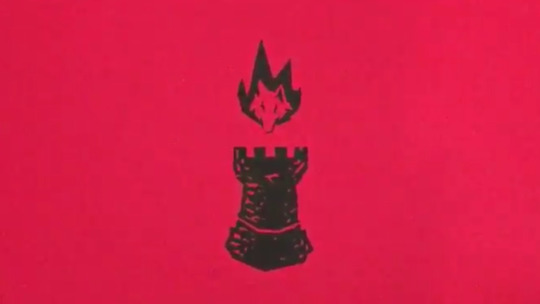
what do you think? ^^
#dragon age: dreadwolf#dragon age 4#the dread wolf rises#da4#dragon age#bioware#video games#dragon age: dreadwolf spoilers#tag since this info came from the leak months ago#long post#longpost#solas#looking thru old meta post drafts hh#what if Solas is like Fenrir and the DA:D PC is Huginn/Muninn to some Odin-like figure..#thought and memory.. they fly all over the world bringing back tidings of events. bringing Wisdom#like Leliana's birds in DA:I#the interpretations of them as being to do with trance-like journeys is also interesting given the Fade is the dream world and#the sea of dreams....#interestingly also Dirthamen has his two ravens Fear and Deceit#he found them in the Fade then outmastered them#endless da chatter hhh#mj meta
120 notes
·
View notes
Text

290 notes
·
View notes
Text
I'm never surprised to learn when writers don't put much thought into things but honestly Alistair and Morrigan being straight-locked makes complete sense to me.
The Chantry is very clearly meant to mirror the Catholic Church and, via banter between Alistair and Wynne, shown (despite Word of God and Doylist explanations) to be sexually conservative; Alistair not considering men as an option full-stop makes complete sense considering he was, in his words, "raised in a monastery" from the age of like eight (or ten? Not looking it up).
Flemeth deliberately raised Morrigan in a swamp, almost entirely away from people, and only ever lured men into her clutches; Morrigan herself admits that she doesn't know hardly anything about socially acceptable behaviors across the board and so, similarly to Alistair, I wouldn't be surprised if interest in women simply never occurred to her.
Conversely, Leliana was a bard and already had Marjolaine as a lover by the time we meet her, and Zevran was a Crow who engaged in sex work when considered necessary and his last relationship was a throuple with a woman and another man.
I'm not saying that it's, like, the only objectively correct conclusion that Alistair and Morrigan are straight. I'm just saying it does make sense for their characters' specific backgrounds, especially given how easy it is to interpret both as autistic. Like I can't speak for all autistics everywhere but I certainly can't invent concepts whole cloth without ever hearing about something similar as a starting point.
All this to say: same-gender Wardens who romance the bi same-gender companions are definitely Alistair/Morrigan's bi awakenings.
#dragon age: origins#alistair theirin#morrigan#da meta#by apples#at least cassandra specifically and explicitly EXPLAINS that she's flattered but Very Straight#afaik you just can't flirt with blackwall OR solas at ALL if you're a dude (and of course with Le Egg only if you're an elf)#(like i get that with solas they were hamfistedly TRYING to avoid the Evil Bisexual trope but like. give him a Straight Scene like cass!)
66 notes
·
View notes
Text
one of those things that's really striking and interesting to me is how often it's simply not addressed when discussing low approval Solas + inquisitor that Solas is, in many ways, acting out his role as the fantasy trickster god. he comes to you in a very humble format; an apostate mage elf, which in the social dynamic puts him veeeeery low on the podium. one of the first things he does in his first conversation is address the fact that HOPEFULLY, the Inquisition will remember who helped, and who did not -- because it is a very real possibility, again, in the context of the social dynamic, for him to be fucked over supremely by the inquisition -- to put him back into a circle, etc. once it's over. of course, Solas knows, and we the player know, that this will never happen, because he's Fen'Harel and such and such. but when interacting with him IN GAME? that social dynamic is vital to understanding why Solas acts the way he does around you. it's fairly easy to rack up approval--simply make the effort to consider a perspective other than your own, a perspective from someone who society has deemed very low (elven mage). slam him down and be belligerent? it only confirms that the leadership here is rooted once again in power hungry individuals who will step on the lowest classes for their own gain.
it's quite literally... fantasy trickster god testing the hero to see if they will treat the humblest person with kindness, or need to learn the error of their arrogance. solas APPROVES almost entirely of things that promote elven and mage freedom, helping the needy, freeing those who need freeing, not playing into being an arrogant leader. when you punch him, in the social dynamic, you are exerted an abuse of power and authority that now goes beyond the verbal, into the physical. could HE, if he were a simple elven mage, defend himself? no. because an elven mage hitting the leader of a holy army back could have him be put to the death. none of this excuses Solas' own flaws, his faulty reasons for his actions, etc. but like, taking into consideration the actual social structure of the game and what kind of power dynamics are going on here, it's necessary to UNDERSTAND the character and what kind of choice you make here, and how it all informs Solas' idea that either 1. he's wrong, this world has things worth saving, but he cannot diverge from his course, even if he on some level wants to be stopped, or 2. this world is just as terrible as the one he left behind, and it needs to be undone.
396 notes
·
View notes
Text
Wow. So much dislike about elves generally preferring to be barefoot in the Dragon Age world.
Y'all.
Why elves not wearing shoes in Dragon Age is completely logical.
Okay, so it’s not a huge secret that I grew up poor. We're talking hardscrabble poor. The kind of poor most people don't think even exists in the western world anymore (I guarantee it does).
To someone with very little ability to buy things, shoes just aren't the priority everyone seems to think they are. City elves are poor in most depictions.
The Dalish would likely feel they'd rather use the materials for something else. They may not be as poor as city elves, but they likely wouldn't be wasteful either. Depending on where they wintered, they might not even use them then. I go out barefoot in light snow and frost, you do actually get used to it.
Fenris is a former slave with lyrium tattoos on his feet. The tattoos cause him pain when touched. Of course he doesn't wear shoes.
I never had shoes in the spring/summer/fall. They just did not exist in my understanding of the world. There was no need to buy and ruin a pair of shoes when feet toughen up just fine.
I grew up in the Adirondack Mountains, by the way. There are a lot of bloody rocks there. You can't dig very far down before you hit bedrock up there.
We had horses and dogs too, (yes, I'm aware of the crappy juxtaposition of parents who pay for horses but not shoes) so it's not like we're talking a pristine woodland.
I'd get a pair of sneakers/runners before school started (usually second hand) and a pair of boots in the winter. I remember having to wear bread bags around my feet inside my boots to keep them dry and whole. Less likely to get frostbite that way.
I distinctly remember my first brand new pair of shoes. I remember my second and third pairs too.
Even now, when I have far too many shoes, more than I could ever need, (I've got a thing for boots, my kids tell me my collection is 'extra'. They're right 🤣) I still prefer to go barefoot. From around April to November, I just don't wear shoes unless I have to. Like, to go into a store or public area; I'll reluctantly wear proper footwear to hike in (and even then they usually wind up over my shoulder instead of where they belong) shoes just aren't the absolute necessity so many folks act like.
I'm aware of what Gaider said about it, that he blamed (unfairly) the art team. It's the director's job to approve things like that, so, uh, bad form.
Still.
It is very possible to have a strong preference for no shoes. You don't really miss what you never had. And to me, it feels like y'all wearing shoes all the time is weird and likely unhealthy. In fact, it kinda is.
"Walking barefoot helps to improve circulation which increases the nourishment of nerves, muscles, and bone of the foot and helps minimize swelling of the lower extremities. Walking barefoot may also help improve the strength and flexibility of the muscles and ligaments of the foot which improves the function of the foot, reducing injuries of the foot, and improving posture and balance of the body."
At most, for just every day, I'll wear a pair of flops if I think the terrain is dangerous enough to warrant it. That's very rarely. I do have a habit of watching where I step though.
In spring, I go out on the tarmacadam to intentionally toughen my feet up. And no, my feet aren't calloused monstrosities.
It's just kinda mind-blowing to me how essential so many people seem to feel shoes are. They just aren't.
To me, it makes perfect sense that the elves, a historically repressed and abused people (sort of like a lot of my ancestors) don't feel they're necessary.
In a medivalish world like Dragon Age, where blights or false gods or wars keep tearing civilization to pieces, shoes would be ridiculously expensive. I mean, soldiers didn't take boots because they thought they were cool. They did it for resale value.
And cobblering is incredibly skilled labour. I was lucky enough to find someone who still knew how to keep my favourite boots alive longer. That guy could make those boots look almost brand new.
But in that world, poor elves would absolutely not be likely to wear shoes.
Shoes feel incredibly confining to someone who didn't grow up wearing them. I utterly loathe the way shoes feel.
I've also been a dancer and martial artist for a large portion of my life. Two groups of people you'll frequently find barefoot.
The way you walk in shoes is completely different from how you walk barefoot.
It's also an incredibly privileged viewpoint to utterly insist shoes are necessary and that elves in a video game should absolutely have to have them.
The only thing I'm annoyed about is that the armours often include boots, which my elves just wouldn't wear. I should have a barefoot option.
It may not be strictly cannon, for the whys behind barefoot elves, but it makes complete sense.
The only elf I'll say it doesn't make sense for is Solas. Why he doesn't wear shoes could just be a big commitment to his cover of elven apostate hobo.
Or perhaps his culture didn't think shoes necessary any more than I do. That would also explain why elves could have a preference for no shoes, it could be a holdover tradition because they all descend from the Elvhen.
It's true that you develop a sense for the earth, or trees, or whatever you're walking on if you don't wear shoes. I spent a lot of time with a book in trees, because few people would climb as high as me so I was safe there. It could easily be that elves wouldn't want to lose that sense, too.
You can learn a lot about an area by what the surface feels like under your feet. If you're a hunter, it's sometimes easier to track if you know your quarry prefers a certain type of terrain. You don't need to look down if you can feel the ground.
In fact, despite what people may think, my feet are incredibly sensitive. Tough, yes, but still very 'feely'.
Point made, I'll stop blathering now 😅.
If you like my content, please consider a tip or becoming a patron. My work of words is my only income and we're living well under the poverty line right now.
KoFi: http://ko-fi.com/A630KKM
Patreon: https://www.patreon.com/KaijaRayne
Paypal: https://www.paypal.me/KaelanRhy
Amazon Wishlist (general): http://www.amazon.ca/registry/wishlist/3H8AY0GKOU0SE/
Kids' wishlist: https://www.amazon.ca/hz/wishlist/ls/C3LS40BFVFPO/
#dragon age series#dragon age#dragon age inquisition#solas#DAO#da origins#dragon age elves#DA2#Dragon Age 2#dragon age meta#Fenris
78 notes
·
View notes
Text
Thinking about how Varric and Solas represent the two sides of Cole...and how that is much that same as Solas and Sera for a Dalish elf inquisitior. Solas representing your elven heritage, your connection to the fade. Sera representing your humanity, your connection to the people around you, the people you need to save. They both see you as being like them in some way but have completely opposite expectations of what that means, and if you lean into your Dalishness you end up disappointing both. Too elfy and never elfy enough.
#the dichotomy...#i love it#i imagine solas and sera do not get in at ALL#and yet lavellan ends up befriending and/or romancing them both#sera would make fun of my lavellan for being all “elfy” with solas#omg imagine the great dread wolf getting taken down by red jenny 💀#i live for the banter where he points out her lack of ideology and organisation tho solas is based af#sera wishes she was doing what he was doing back in the day#but she also cares SO MUCH about PEOPLE and solas doesnt even see people as people#ughhhhhh#da#dragon age#dai#solas#solavellan#sera dragon age#sera dai#lavellan#dragon age inquisition#inquisitor#dragon age meta#varric tethras#cole dragon age
19 notes
·
View notes
Text
It's 5 in the morning right now and I should be sleeping but I got to thinking about Qunari and how they're most likely elves with dragon blood mixed in. How that most likely means that mad scientist Ghilan'nain was involved. How that means the kossith are most likely ANCIENT ELVES. No wonder Solas hates them so much, he can barely stand modern, mortal elves, and that was HIS fault! Imagine how he feels looking at an entire race of elves that have been so corrupted and changed, then on top of that, made slaves of the Qun? How the Qunari, who famously hate and fear magic, have had their history of the kossith wiped from their records and memories because they came from a once entirely magic race? How have I never connected these dots before?!?
#I'm probably not the first to have these thoughts#I could always be wrong too#BUT IT FITS TOGETHER TOO WELL DAMN IT#dragon age#dragon age: origins#dragon age 2#dragon age inquisition#dragon age 4#Qunari#solas#kossith#Ghilan'nain#dragon age theory#dragon age theories#dragon age meta#da theory#da meta
233 notes
·
View notes
Text
so this probably has been discussed many times but i've been thinking about that bullshit take solas says to qunari inky and how it confuses me
so solas says to adaar that "the qunari are savage creatures whose ferocity is held in check only by the rigid teachings of the qun" but you're totally not like them inquisitor you've impressed me :) like he probably knows how the qunari were created etc etc but either way not cool bro
and most importantly, i find it very weird considering his dialogues with bull since we learn that solas hates the qun as a tool to brainwash people and strip them of their freedom. He says the complete opposite of what he says to adaar and even pretty much disapproves of bull calling the tal-vashoth "savages", arguing that they turn out like this precisely because of the qun:
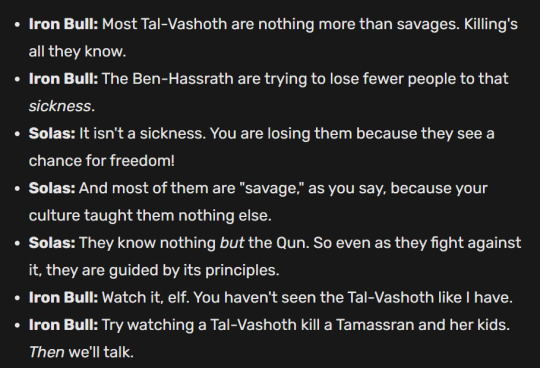
also this haha im okay
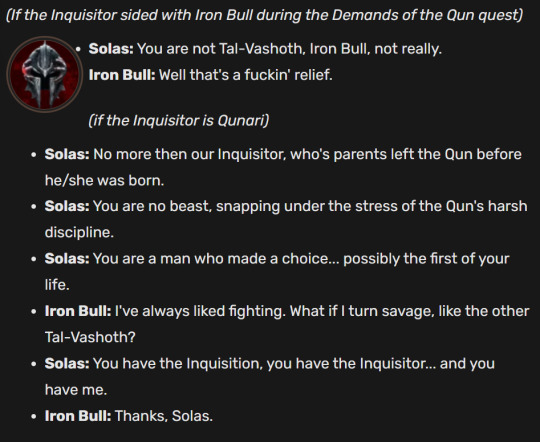
so i don't know what to think of it. it's either a change of opinions/character development (?) or a plot hole. or maybe something else i don't see.
#dragon age#solas#adaar#meta#da meta#dragon age inquisition#txttag#i mean he's still biased#also i'm not an expert on the qun and i have A LOT to read
60 notes
·
View notes
Note
after LOTS of procrastination, I finally finished Dragon Age: Inquisition and Trespasser. I FEEL EMPTY. what do I even do now? SOLAS WHY WOULD YOU DO THIS TO ME?! I would join him, I don't care if we destroy the world, I'll help him. hell, I would do it FOR HIM! And he won't let me?! I am mad…. also madly in love… UGH, I now truly understand the solavellan hell TT_TT. Don't get me wrong I think it's great and it breaks my heart in the best way. ALSO, I can't imagine having to wait for da:d since Trespasser was released 🫡. I'll have to wait about a year and even that is too long. 💜
Welcome welcome >:D that's a common feeling after Trespasser for sure, and then you'll move through the remaining stages of grief and settle someplace before acceptance I think.
I do like that Lavellan, even Lavellan who had low approval, is able to offer to help him. And I love (LOVE) that he turns them down. He's made Lavellan complicit this far and he doesn't want to drag them through more mud and blood and pain but most importantly? He doesn't want them to change. Not like he has.
There's something to be said (and others have said it better than I) for the mirroring between Anders and Solas especially in their respective endings. Both needed the protag to help them enact change, but only one was able to endorse their actions afterwards and run away with them. Solas is too old, and too proud, and too independent. He's told us from the beginning — it's been so long since I could trust someone, and even then he only promised to work on it. He's shown us all along, in explicit banters that say so, that he does not need anyone. How miserable for a man most afraid of dying alone.
Anyway, once again, welcome! Your feelings may change between now and da4 and that's more than fine — my own have since I first played in 2020! I hope you enjoy the rich meta and fic and art and thought-pieces that have been produced in the last 10-ish years, and that it tides you over until we get fresh meat. I know I'll probably still be here in my little corner, spinning my little ideas and fantasies until they're shattered forever by new canon.
#solas#da meta#solavellan#asks#i'd like to say that it gets better but uhhhhh i'm still here aren't i#💜
52 notes
·
View notes
Text
ok, i have to put my dragon age: dreadwolf theories down somewhere for posterity, so my thoughts on dreadwolf and the origin of the blight:
what if dreadwolf is the blight?
theory + supporting evidence:
the dreadwolf title announce page says that "dreadwolf" is solas' namesake
solas himself says that "the dread wolf" is a misnomer
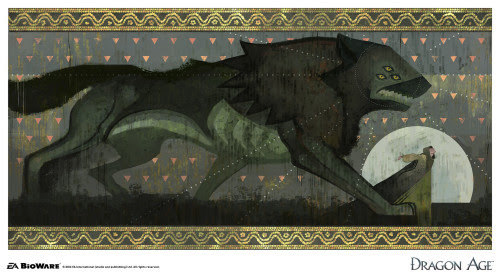
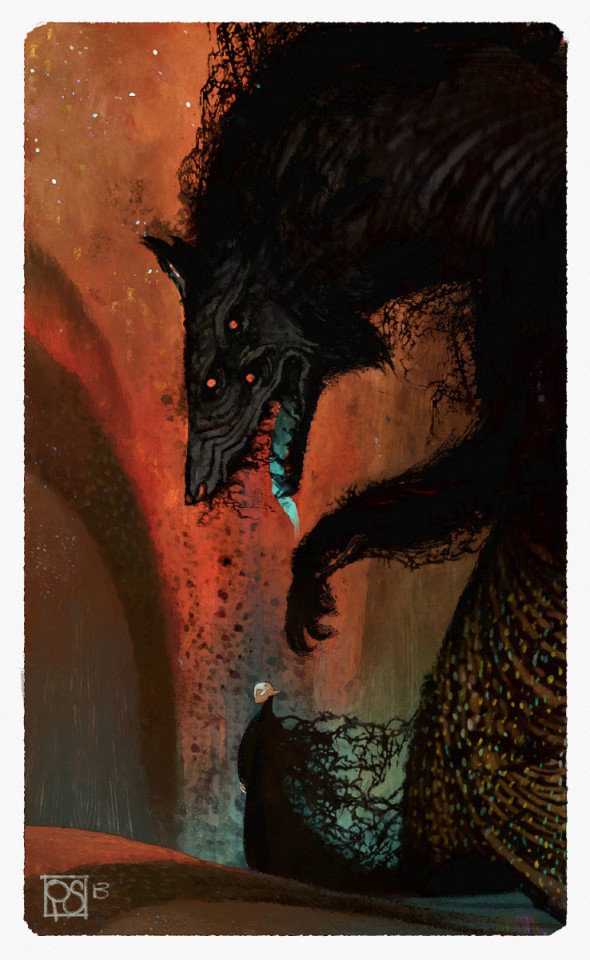
solas leading the dreadwolf into the fade, potentially as a weapon to use against the evanuris. i take the former picture as his own interpretation of his actions (freeing, leading, liberating) and the latter as the potential truth (the wolf is a dangerous weapon). it also looks tainted
solas could have tricked the evanuris into believing the blight made them stronger, when it only made them mad and evil.
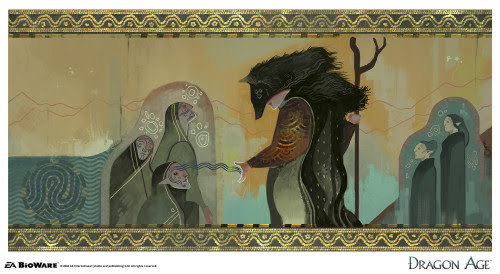
this would explain why he is the dread wolf - named after the dreadwolf, the trick he pulled to defeat the evanuris, the cloak in which he wrapped himself.
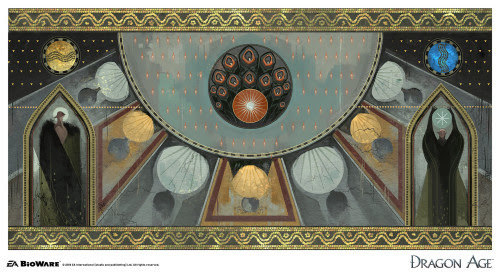
the evanuris are locked away; each god a key in the black city, protecting thedas from the blight. he has to create the veil to do this. binding them into the fade itself prevents anyone from reaching them - or so he thinks.
the black city is breached; the magisters let the blight into thedas; gradually, the gods find their way into the archdemons, and the death of each one is another chain falling off the black city. when all are killed, the blight's full force will invade the fade and thedas
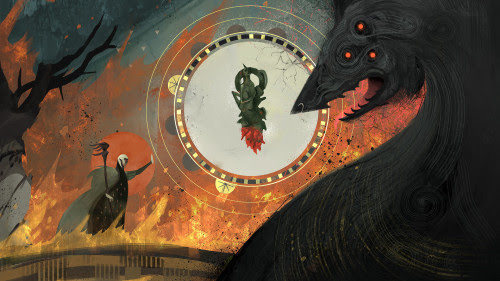
ever since, it has been growing more powerful - infecting even lyrium, now. desperate to stop it, solas must turn around and face the weapon he used, stand between it and the world. there are two gods that remain (the ones we see in da4 concept art). when they are dead, the blight will ravage everything in its path.
this would explain why he loathes the wardens, why he tells them they're messing with things they can't understand. they're killing his keys. not that they have any choice - but they are, and it will eventually unleash the true power of the blight.
#head full many thoughts#i wanted to put it somewhere in case i'm right#hope this interests some of u tho#dragon age#dragon age spoilers#dragon age meta#dragon age theories#the blight#solas#trespasser#da4#da:d#da:dw#da: dreadwolf#dreadwolf meta#grey warden#evanuris
172 notes
·
View notes
Text
So, weird thought. I’ve got an extra large tin foil hat on tonight.
If Inky drinks from the Well, she knows Solas’ password in Trespasser. How? It’s not just about knowing Elvhen. You have to know it. The Well is the repository of Mythal’s priests’ knowledge. They shouldn’t know Fen’ Harel’s password.
Also, Solas was the one turning on all the security systems - the guardian spirits and the library. How does he know how to do that? He doesn’t bind spirits. Why would he use them?
How was he able to override the Eluvian magic personally? I’m assuming only an Evanuris could do that. Did he get that information from Mythal? Was he the Evanuris’ head of security? Is Mythal actually in charge of Solas’ body or is it an Anders/Justice situation?
I need answers.
#solas#dragon age#dragon age inquisition#solavellan#dai#solasmance#fen'harel#solas dragon age#solas dread wolf#dai solas#solas trespasser#da solas meta#da solas Mythal#mythal
26 notes
·
View notes
Text
Embracing Dirthamen’s Gift of Prophecy:
DA Dreadwolf Lenormand Grand Tableau (2/ ?)
In this part, I focus on the traditional gendered signifiers in Lenormand, which in this specific reading look suspiciously like antagonists.
PART 1
Major Figure 1: Snake-Woman
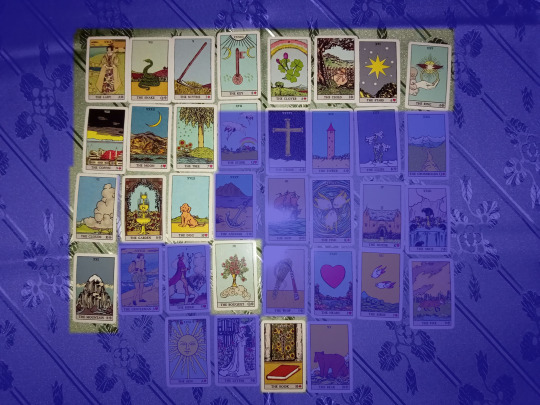
The first row of the spread kicks off with the Woman in 1st and a Snake in 2nd – a femme figure with major importance to the plot. They are portrayed as charismatic, layered, possibly deceitful or covert in their actions – likely a spy. They will bring about a temporary scheme or a contrivance that turns out to be more trivial than it seemed in the beginning. Shocking and groundbreaking revelations of some private or confidential information will be made to the party (Scythe in 3rd, Key in 4th). It might as well be that the entire mission is a setup to get the party to the Woman, so that they can sway the protagonist to their side.
Moving a little further to the cards that surround the Scythe, it seems that the Woman’s agenda, known to be very rigid, is now upset about their progress being too slow, or they worry about being unable to adapt to an inevitable deep change (Moon-Tree-Stork). This is why the Woman is determined to take radical steps – perhaps even go for a kill to resolve what they consider a serious security issue (Snake-Scythe-Key). Looking at the Snake-Moon pair in between the Woman and the Scythe, we are warned that this person manipulates and deceives for a living, since the Moon in Lenormand represents career, long-term goals, purpose and achievement-based reputation. This person’s greater goal, motivation and calling is more complicated than meets the eye. Their interactions with the protagonist might involve layers of deceit, riddles, and tests of mettle.
They might promise to redeem the protagonist from their threat of punishment. The protagonist will receive a promise of relief from some worries and a chance to start again. The party making the offer is depicted as strong and grounded, and the promised fortune would be long-lasting (Clover in 5th + Child in 6th). But as it turns out, this vision or promise of a reward is not what it seems (Stars in 7th). The protagonist’s lack of experience, their naivety or agreeableness lead them to be deceived or manipulated. The contract – quite possibly to assassinate someone – that is sealed from that place of misinformation, might turn into the greatest problem the party will have to eventually deal with (Ring in 8th, chained with Mountain in 25th).
Now let’s take a look at the column where the card lies. When paired with the Coffin in 9th, the Woman figure will request the party to end something permanently, or to proverbially bring some skeletons out of the closet. The thing in concern is presumed to be overdue, rotten, or it’s literally contained and buried deep underground. Within the Dragon Age context, it would have something to do either with the Blight and the remaining Archdemons, or with ancient elvhen ruins, like the ones explored in Genitivi Dies in The End and The Missing. With the Clouds in 17th following, the party might hope to gain some clarity and respite from trouble from completing this assignment, but some information in the context is being concealed or repressed. The hidden or withheld part is possibly how persistent and difficult to remove the problem is (Mountain in 25th).
A straight diagonal line from the Woman card leads through the Moon in 10th, Dog in 19th, Bouquet in 28th, and the Book in 35th. This figure has a reputation of someone dangerous, radical in their methods, someone who can attack swiftly and cut where it hurts most. In this position, the Moon card gives a major warning that cooperation with that figure, linking one’s purpose to them, might put the party in a deadly danger.
With the Moon and the Dog in 19th, they are perceived as fiercely loyal to their friends – yet, with the Dog being in the House of the Tower, there’s an extra warning message that they might actually try to isolate the party or lead them astray from their true goal. The Tower as a house meaning also hints that this person occupies a high position within some rigid, highly organized structure. This profile reminds me of Rasaan, who has appeared in comic books and Tevinter Nights – the second person after the Ariqun within the Ben-Hassrath, who searches Northern Thedas for traces of Solas’s ancestry and his “true name” in hopes that these can reveal his greatest weakness to the Qunari.
The Woman figure will eventually offer previously unknown, reliable information that is central to the Man (Bouquet in 28th + Book in 35th) and has vital importance to the entire story and the future in general (since the Book is one of the cards in the shorter Line of Fate, which is said to have predictive significance)..
Now, for a final look at some hidden motives in the cards knighting the Woman. With the Tree in 11th and Garden in 18th, the figure is shown as strongly dependent on their network, public connections and a certain role or front they have assumed. Our attention is brought to the well-being of an ancestry, a society or a widespread network. With the Tree in the House of the Whip, the well-being of the structure in concern relies on a high level of discipline, but it might as well be cyclically put into question due to tensions and conflicts. If my interpretation is correct, it would confirm the repeated rumours of inner strife within the Qun.
Major Figure 2: Book-Man
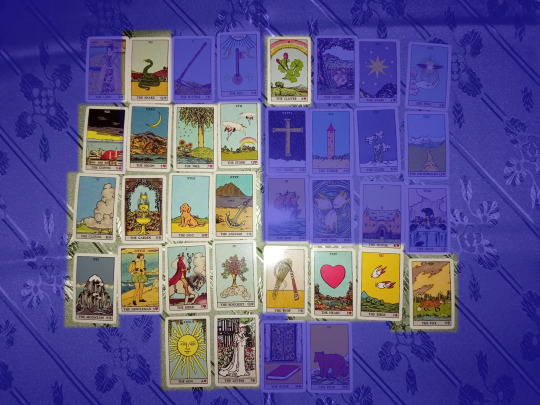
The Man card lies in the same row as the Birds that represent the protagonist, so there’s a subplot directly connecting them that I already covered in the 1st part of the reading. In the column starting from the Man card, we have Garden in 18th through Moon in 10th and Snake in 2nd. It appears that the Man, too, relies on their network and a certain public facade. They, too, have a reputation of someone dangerous and radical. They appear to be operating openly and purposefully towards certain results (Garden + Moon), but something about that impression isn’t entirely transparent. The Man’s motivations and concerns are covered by the same cards that clarify the Woman’s place in the reading (Moon + Snake).
Interestingly, the Man’s “portrait” (made of up to 8 surrounding cards) is more complete than the one of Woman’s. On the left, representing the past influence over them, we have Clouds in 17th and Mountain in 25th. It seems that the Man had recently come out of some stalemate and changed their mind about some problems of his being irremovable. A more intuitive approach to the Clouds in the House of the Stork might represent a literal transformation in the clouds or in the sky – which makes me believe the Man card represents Solas.
In their present situation, they are building a network and gathering allies; albeit, since the Man is in the house of the Book, they would remain concealed and indirect. In the nearest future, it seems that the Man’s old ally or friend, who has been skeptical towards him or has gone their separate way, arrives with an epiphany that heralds The Man’s success, or at least fills him with confidence (Dog-Rider-Sun).
A diagonal line from the Man goes through the Dog in 19th, Stork in 12th, Clover in 5th. They might pose as an ally to some organizations. But another meaning is the one we’ve already seen in relation to the Woman, since both characters’ diagonal lines meet at this exact card. It seems that both the antagonists will try to separate the party from other allies and the true objective, and pit the protagonist against the other side. The symmetry between their respective columns makes it look like they’re jousting, charging to confront each other halfway. Interestingly, these are the two columns starting the spread, and almost everything else happens outside them, as if both these parties had tunnel vision on their rivalry!
The Man will offer an alliance to bring forth a new beginning colored with spiritual profundity – a long-term, fortunate change of circumstances that they consider to be a necessary condition for thriving and well-being (Clover in 5th). They might receive reluctant help from an agent who's skeptical or cold towards the idea. The change will feel upsetting, chaotic, ill-considered, or carried out impulsively (Dog in 19th + Stork in 12th).
The Man is knighted by Tree in 11th, Anchor in 20th, and Letter in 34th. Interestingly, the Man and the Woman figures share the knighted Tree in 11th, as if the information in that particular area was the crux of their tug-of-war. The Man likely aims to make something in this regard widespread public knowledge, and the Woman might be counteracting to keep it hidden at all costs.
The pairing between the Letter in 34th and the Sun in 33rd makes it look like there is an abundance of absolutely priceless lore to be revealed, that ultimately validates the Man and figuratively shines the light even on things they might have been unaware of (looking at the Clouds-Man-Sun diagonal surrounding them). These are the cards in the Line of Fate, leading up to Bear in the House of the Cross – could this be a confirmation that this arc culminates in a revelation of Mythal as the ultimate antagonist?
#esoteric thedas#dragon age meta#dragon age dreadwolf#da dreadwolf#dreadwolf#lenormand readings#grand tableau#solas#rasaan#dread wolf#mythal#flemeth
3 notes
·
View notes
Text
God to put in the perspective of Solas and waking up to a world you do not recognize and there's this Dalish that somehow manages to intrigue you, but think about it 1000 years is like 5 years Solas' time, how inquisition was mere SECONDS in his long life and how easily he was at Lavellans feet, how one kiss changed his whole trajectory of his life, how one small romance for people who didn't even matter to him, almost made him throw away his ENTIRE life's work. And knowing that even in mere seconds or a week in Elvhen time made Solas realize what he was truly missing and how he comes to regret it! The regret spirit even says that he regrets using and betraying his FRIENDS. A WEEK. IN ELVHEN TIMES and he considers these people his FRIENDS.
Then how that will parallel Lavellan, 10 years is their 1000 years, how a Lavellan will be where Solas was at the beginning of inquisition, afraid to kiss, afraid to trust, afraid of the betrayal they feel will come, just afraid. But this time (with the protagonist's help) Solas reaches out to her, shows her what he's hidden, and shows her the deepest memories he has just to gain back her trust. How he will most likely lay himself down once more to her, let her take control. He will be gentle because he knows that's what he needed long ago.
128 notes
·
View notes
Text
Periodic reminder that I still think it’s hilarious that everyone thinks they know so well what Solas’ plan is, after he *explicitly didn’t tell us*, or what Solas did in the past, when we *explicitly don’t know*, that obviously they can make a full and complete judgement of his actions. Bonus point because he himself doesn’t seem to think he fucked up in that regard, and he’s not exactly easy on himself. Extra-bonus points that people always wanna take his Trespasser conversation as the literal truth while being super mad about all the lies he’s supposed to have told previously.
Having been rather obsessive about the lore and meta in the past, I have a variety of guesses as to what he did in the past, and significantly fewer as to what he plans to do, and actually NONE of those involve him being an arrogant fuckup.
64 notes
·
View notes
Text
dragon age………. cosmic horror AU
#herearedragons speaks#I’m not a big horror fan#but I like watching cosmic horror ttrpg podcasts sometimes#like call of c.thulhu or c.andela obscura#and I just had the thought that my inquisitors have cosmic horror protagonist vibes actually#Neil is the one who’s the most sensitive to The Horrors#Evelyn is the distinguished young lady who gets roped into the plot by accident#or also I could see her as a journalist#Aqun is the scientist trying to make sense of The Horrors and utterly failing as they are Unknowable#and May is the tough/stoic one. the one who survives not through sophistication but through willpower and determination#also it should be the fun kind of horror where the protagonists are allowed to survive#herearedragons meta#ALSO there are so many things in da you can crank up just a little and have a cosmic horror-level threat#red lyrium. the titans. the Evanuris. the blight. the fade. even Solas
6 notes
·
View notes